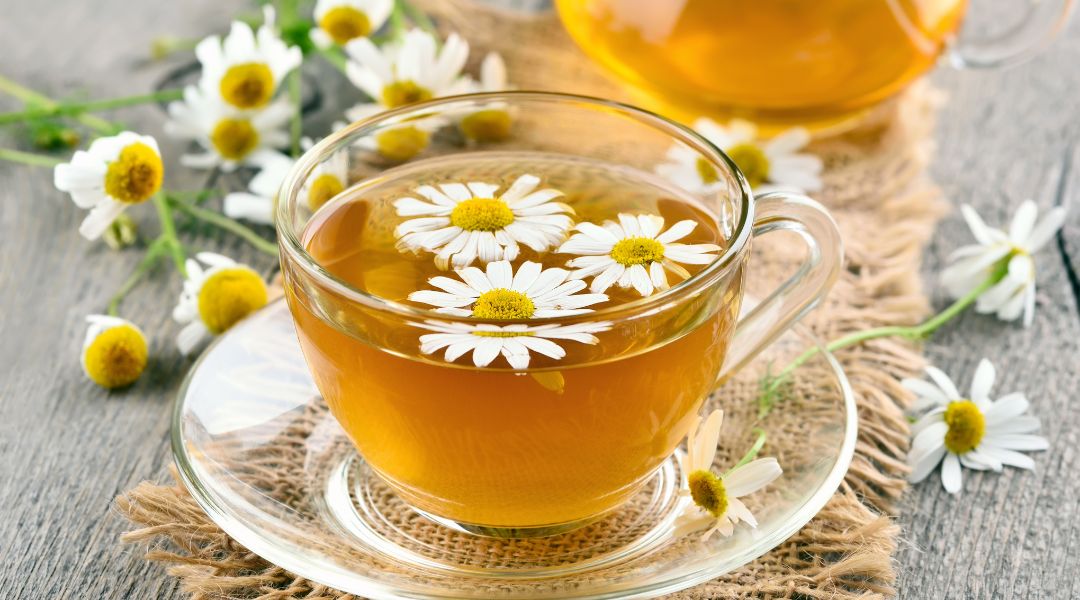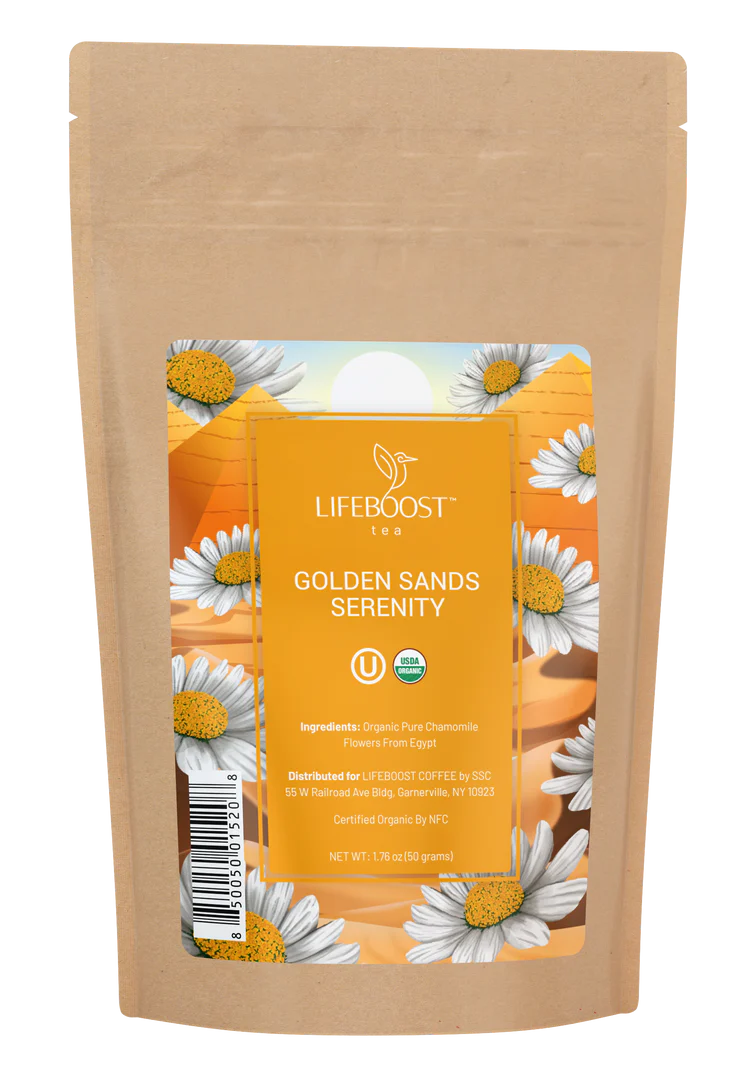
10 Soothing, Science-Backed Health Benefits Of Chamomile Tea
The ancient Egyptians considered it to be sacred.
The Greeks and Romans have used it for its mighty medicinal benefits for centuries.
Even in medieval times, through plagues, ailments, and other medical trials, Europeans loudly lauded the praises of this powerful herb.
What herb or flower am I referencing? Chamomile.
Chamomile is one of most popular and commonly consumed herbal teas, and today, while many simply enjoy this tea for its flavor and calming effect, there’s truly so much more to chamomile tea when it comes to its effects on the body.
Throughout history chamomile has even been known as “the plant’s physician” as the benefits of this herb were enjoyed by neighboring plants which remained healthy simply due to its presence.
So, what can an evening mug of warm chamomile tea do for you?
And, what benefits could you reap when including this ancient wonder as a routine part of your day?
What Is Chamomile?

Chamomile is a type of flower, similar to a daisy in appearance and an apple in scent.
The name chamomile comes from a Greek word meaning ground, or earth, apple, and other translations of this name also reference apples.
While this description mostly refers to the scent of the chamomile flower, I have to wonder if the slight natural sweetness detected in chamomile tea comes from the flower’s apple-like scent, as taste and smell are so closely linked.
But, I digress…
As I just alluded, and as you likely already know, the dried version of the chamomile flower is used to make chamomile tea, one of the most popular herbal teas.
Though, you may have actually heard chamomile tea referred to as an infusion as opposed to a tea.
This is simply because herbal teas are not made from tea leaves, instead being composed singularly or as a combination of citrus or berry fruits, spices, or herbs (like the chamomile flower).
And, like all herbal teas, or infusions, chamomile tea is naturally caffeine free.
For centuries, chamomile tea has been used across the globe as a natural remedy for a variety of health ailments due to its antioxidant, vitamin, and mineral content.
Chamomile flowers are small but mighty, containing many bioactive phytochemicals and flavonoids which serve as antioxidants, as well as potassium, calcium, carotene, folate, copper, zinc, iron, and vitamin C.
These flowers are even used in the making of many skin care products due to their antioxidant, anti-inflammatory, and soothing qualities.
The flavor of chamomile tea can be described as mild, slightly (naturally) sweet, somewhat earthy, and soothing or calming.
In fact, most individuals drink chamomile for its soothing and calming qualities. And, this tea’s ability to bring a sense of calm tranquility to those enjoying a warm mug is commonly its most touted health benefit.
But, there’s so much more than peace and relaxation to be enjoyed when regularly sipping chamomile, and that’s what we’d like to explore in our time today - the many science-backed health benefits of chamomile tea…
Golden Sand Serenity Tea
Golden Sands Serenity: The Egyptian Chamomile Tea That Whispers Peace
Shop Now
10 Powerful Health Benefits Of Chamomile Tea
1- Reduced Stress, Rest. And Relaxation

Possibly one of the oldest known benefits, and likely one of the most widely known rewards, of consuming chamomile tea is its effect on rest and relaxation.
Chamomile has been used for centuries to promote better sleep as it has a mild sedative effect which not only helps you fall asleep but also works to improve sleep quality.
This is why many folks report feeling rested and refreshed the morning after a night time cup of chamomile tea.
Unfortunately, for those suffering with insomnia, chamomile has not yet been shown to improve this condition.
But, for those with improved sleep quality, having benefited from the consumption of chamomile, this benefit has been proven to extend to other areas of health (connected to sleep) such as anxiety and depression.
2- Reduced Risk Of Anxiety And Depression (as it pertains to sleep quality)
While studies regarding the effects of chamomile have yet to prove a direct reduction in anxiety or depression, this benefit has been evidenced as a link to chamomile’s positive effect on sleep quality as well as general relaxation.
Regarding relaxation, chamomile can act as a mild sedative, and these effects can help to soothe and calm the mind which aids in stress reduction and potential anxiety relief.
But, as studies have shown how poor sleep quality can increase one’s risk of both anxiety and depression, the effects of chamomile on sleep quality have proven to be promising for reducing anxiety and depression through these sleep benefits as well.
In other words, as chamomile tea improves one’s quality of sleep, experts believe this may have long term positive effects on mental health (including anxiety and depression).
3- Menstrual Symptom Relief

Research has proven chamomile flowers, when consumed as a tea, to have anti-inflammatory, antispasmodic, anti-anxiety, and even sedative properties.
When each of these benefits combine, this has been shown to relieve both anxiety and the pain or discomfort commonly experienced with premenstrual syndrome (PMS).
The antispasmodic properties of chamomile can relieve the painful cramps many experience prior to and during menstruation.
And, as the tea helps to control dopamine and serotonin levels, this has been shown to offset or reduce symptoms of anxiety and depression that are often associated with premenstrual syndrome.
4- Lowers Blood Sugar
For those individuals with diabetes, some studies have shown chamomile tea to have a positive effect on blood sugar levels, namely that chamomile flowers can potentially improve glycemic and lipid profiles in those with diabetes mellitus.
Research has also shown chamomile to effectively reduce oxidative stress in those with diabetes.
And, regular consumption of this tea may even decrease the risk of complications associated with this disease.
This promising bit of info comes from a recent study conducted where scientists claim chamomile may help prevent complications from type 2 diabetes such as heart disease, blindness, and kidney damage.
5- Digestive Aid

Chamomile tea has been used and valued as a digestive relaxant, treating everything from flatulence and indigestion, to diarrhea, nausea, vomiting, and even motion sickness.
Studies conducted in Turkey specifically note the benefits of chamomile pertaining to gastrointestinal pain relief, and Integrative Medicine research has shown chamomile to be effective at reducing inflammation as well as soothing symptoms associated with gastrointestinal reflux disease.
Broadly speaking, regular consumption of chamomile tea is said to lead to improvements in overall gastrointestinal health.
6- Better Heart Health
One class of antioxidants found in chamomile tea are called flavones, and these have been studied regarding their effects on risk factors for heart disease.
Both high cholesterol levels and high blood pressure are known to increase one’s risk of heart disease, and studies have shown those individuals who drink chamomile tea with meals to experience decreased total cholesterol levels.
Chamomile was also found to specifically reduce LDL cholesterol levels, the type of cholesterol known to cause narrowing in the arteries, which can lead to high blood pressure, chest pain, shortness of breath, or a heart attack.
7- Reduced Risk Of Cancer And Complications Of Cancer

The antioxidant content of chamomile tea has been studied for its potential effects on cancer, and researchers have found this tea to reduce certain types of the disease.
In test tube studies, one potent antioxidant found in chamomile attacked cancer cells found in the breast, digestive tract, skin, prostate, and uterus.
Other lab studies have shown that chamomile may prevent the growth of glioma, leukemia, liver and cervical cancers.
Then, another study found regular consumption of chamomile tea (2-6 times per week) to be effective at reducing one’s risk of developing thyroid cancer.
But, aside from fighting against and reducing the risk of some cancers, chamomile has also been shown to mitigate the effects of both cancer and cancer treatment.
This is evidenced in a 2023 review published in Integrative Cancer Therapies, where chamomile was listed as effective at reducing oral mucositis, skin complications, depression, and vomiting in cancer patients.
8- Soothes Symptoms Of Illness And Potentially Boosts Immune System
Some experts believe chamomile to be a great way to support your immune system, and others have found there to be potential in this regard to fight the common cold.
Further studies need to be conducted to confirm chamomile’s role in preventing a cold, but evidence does show that this tea can help to soothe the symptoms associated with such a viral infection.
And, one cold and flu symptom chamomile tea is most noted for improving is that of a sore throat. So, the next time your throat is feeling scratchy and painful, try sipping on a warm mug of chamomile with a bit of honey as this addition can amplify chamomile’s anti-inflammatory benefits as well as soothe any irritation in your throat.
Then, chamomile’s antispasmodic properties can even suppress the body’s cough reflex, another benefit for the common cold as well as the flu.
While no significant studies can confirm this, some reports even indicate that individuals have benefited from chamomile in treating hay fever, swollen sinuses, and nasal congestion.
Aside from this, in ancient medicine chamomile was actually used to treat ulcers, wounds, burns, and even hemorrhoids.
9- May Improve Bone Health

Another potential benefit realized from chamomile’s ability to reduce oxidative stress in the body is found in relation to bone health.
This, of course, would be an overall benefit of reducing this type of decline in health due to the effects of aging.
However, a 2022 study in rats also found that chamomile prevented osteoporosis combined with steroid treatment.
While these studies are not yet conclusive in humans, they are certainly promising.
10- Reduces Inflammation
Some of the benefits noted here today can be linked to chamomile’s anti-inflammatory properties.
And, while we’ve seen how reductions in inflammation can aid in specific areas, generally speaking, reducing inflammation in the body is directly connected to many more improvements in overall health and wellness.
Inflammation, specifically chronic inflammation, is linked to a variety of conditions and diseases, even those which are life threatening, including cancer, autoimmune disorders, cardiovascular disease, diabetes and more.
And, chamomile flowers (used to make chamomile tea) contain oils which are converted to chamazulene and other flavonoids which possess these powerful anti inflammatory aids.
To Drink Or Not To Drink

I know, that sounds like a questionable heading after all of the benefits we’ve just explored, but there are a few things to note when it comes to chamomile tea.
For most folks, everything we’ve discussed above applies when it comes to enjoying one, two, or several cups of chamomile each day. However, for a small group of individuals, some of the general benefits of chamomile may actually prove harmful.
So, as we wrap things up, let’s consider these potential warnings.
Allergies
If you are allergic to asters, chrysanthemums, ragweed, or daisies, you may also be allergic to chamomile.
Of course, this isn’t definitive; however, if you do have such allergies, you may wish to speak with your healthcare provider prior to consuming chamomile.
Pregnancy
Chamomile tea is considered generally safe to consume during pregnancy, but when consumed in large quantities, this tea has been known to stimulate the uterus and even cause miscarriage in some individuals.
The medical advice and warnings regarding chamomile tea consumption in pregnancy generally surrounds drinking the tea in excess; however, it may still be wise to consult with your midwife or OBGYN regarding safe levels during pregnancy.
Caution While Driving
Remember the relaxing qualities of chamomile we discussed above? Well, this can be mild for some and much more potent for others.
So, as the relaxing qualities of chamomile can result in drowsiness for some, it is best advised to avoid driving after enjoying a cup or two.
Nausea & Vomiting
This word of caution is something that resonates personally as I enjoy my tea stout, potent, highly concentrated, and just about any other adjective you could use for excessively strong.
But, if you’re like me, typically steeping a strong cup, in the case of chamomile, this can cause nausea and/or vomiting when consumed in large quantities.
In other words, if you experience nausea or vomiting after drinking chamomile tea, this may simply be because you’re brewing your tea too strong or consuming too much.
Medication Interference
Since chamomile has been shown to lower blood pressure, those individuals who are currently taking blood pressure lowering meds should exercise caution when consuming chamomile.
This is also true for those taking medicines to treat diabetes as chamomile also has the ability to lower blood sugar. And, drinking chamomile tea while taking such medications could potentially increase one’s risk of lowering blood sugar levels too much.
Individuals taking blood thinners should exercise caution as well when consuming chamomile as this may increase the risk of bleeding.
And, chamomile has also been known to increase the effects of some sedatives, insomnia medications, seizure meds, antidepressants, and barbiturates as well as alcohol.
As health is individualized, the above considerations should be discussed with your healthcare provider to know which, if any, of these precautions are specific to your unique body and condition.
Chamomile Tea
The Egyptian Chamomile Tea That Whispers Peace
Check out Lifeboost Coffee Golden Sand Serenity Tea.
Medical Disclaimer
This content is for informational and educational purposes only. It is not intended to provide medical advice or to take the place of such advice or treatment from a personal physician. All readers/viewers of this content are advised to consult their doctors or qualified health professionals regarding specific health questions. Neither Dr. Charles Livingston nor the publisher of this content takes responsibility for possible health consequences of any person or persons reading or following the information in this educational content. All viewers of this content, especially those taking prescription or over-the-counter medications, should consult their physicians before beginning any nutrition, supplement or lifestyle program.

Becky is a mother, educator, and content writer for Lifeboost Coffee. She has had three years’ experience as a writer, and in that time she has enjoyed creatively composing articles and ebooks covering the topics of coffee, health and fitness, education, recipes, and relationships.
- https://www.zhiherbals.com/blog/67-chamomile-fun-facts
- https://www.greenjeeva.com/blog/chamomile-nutrient-profile-types-uses-and-more#
- https://www.merckmanuals.com/home/ear,-nose,-and-throat-disorders/symptoms-of-nose-and-throat-disorders/overview-of-smell-and-taste-disorders
- https://twiningsusa.com/collections/herbal-teas/caffeine-free
- https://www.health.harvard.edu/nutrition/the-health-benefits-of-3-herbal-teas
- https://artfultea.com/blogs/wellness/chamomile-tea-benefits
- https://www.diabetes.org.uk/node/4128
- https://nutratea.co.uk/benefits-of-chamomile-tea/
- https://www.healthline.com/nutrition/5-benefits-of-chamomile-tea
- https://my.clevelandclinic.org/health/symptoms/21660-inflammation
- https://www.ncbi.nlm.nih.gov/pmc/articles/PMC2995283/
- https://www.medicalnewstoday.com/articles/320031#benefits
- https://www.eatingwell.com/article/8067374/chamomile-tea-benefits/
- https://health.clevelandclinic.org/honey-for-sore-throat-and-cough
- https://www.ncbi.nlm.nih.gov/pmc/articles/PMC2995283/
- https://www.sciencedirect.com/science/article/abs/pii/B9780323358682000426
- https://www.ncbi.nlm.nih.gov/pmc/articles/PMC6970572/
- https://www.ncbi.nlm.nih.gov/pmc/articles/PMC2995283/
- https://www.mountsinai.org/health-library/herb/roman-chamomile
- https://www.pregnancybirthbaby.org.au/herbal-teas-during-pregnancy-and-breastfeeding
- References for the article to confirm data and information.









